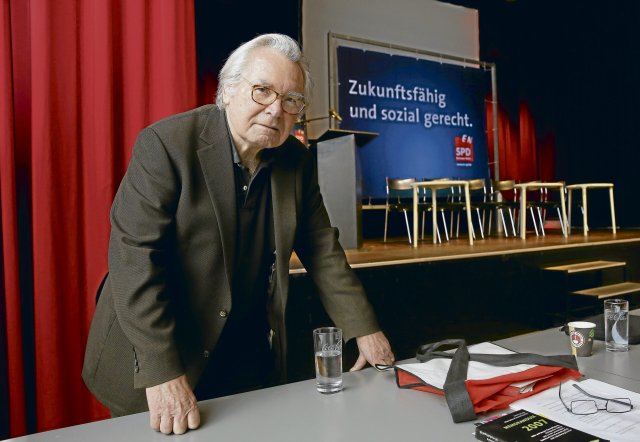In the end he was the Federal Chancellor’s advisor: Oskar Negt
Photo: IMAGO/Funke Photo Services
Don’t always just negate and criticize, sometimes make better suggestions – the work of the sociologist Oskar Negt can be summed up with this typical adult demand for rebellious youth. But it’s not as bourgeois as one might think on the left wing. As long as social conditions are, roughly speaking, frozen, left-wing scientists can also concern themselves with the question of what practical conclusions can be drawn from critical theory. This is more humanism than positivism.
It makes a lot of sense to work for the trade unions on this too, because, according to Oskar Negt, democracy is a “social form of life that does not create itself, but has to be learned”. In concrete disputes about better working conditions for people. This is as true in 1968 as it is today.
nd.DieWoche – our weekly newsletter

With our weekly newsletter nd.DieWoche look at the most important topics of the week and read them Highlights our Saturday edition on Friday. Get your free subscription here.
Negt was about subject development through education and work organization. As a young man, he was active in the educational work of the DGB and in the mid-1960s he wrote an important educational concept for IG Metall, which he called “Sociological Imagination and Exemplary Learning.” 20 years later, he wrote “Living Work, Expropriated Time,” the decisive program document for the fight for the 35-hour week, which still does not exist across the board. Who else is there besides the unions? In 1980 he was co-founder of the Committee for Fundamental Rights and Democracy. In the 1960s he was kicked out of the SPD because of the SDS, and in the 1970s he stood between it and the decided left in the Socialist Office that he helped to initiate. Finally, he was back on the SPD side as a “sympathizer.” This too is a sentimental political education.
Oskar Negt was professor of sociology at the University of Hanover from 1970 until his retirement in 2002. He came from the Frankfurt Institute for Social Research, did his doctorate under Adorno on the ideas of Compte and Hegel and then worked as an assistant to Jürgen Habermas. Unlike him, he supported the occupation of Frankfurt University by students in May 1968, which was renamed “Karl Marx University” for three days before it was evacuated by the police. Habermas considered such forms of action to be bad and violent; Negt defended them in his foreword to the anthology he edited, “The Left Answers Jürgen Habermas.”
Negt came from a small farming family near Königsberg in East Prussia and fled to Denmark in January 1945 as a 10-year-old with two sisters, where he lived alone in a refugee camp, separated from them, for two and a half years before the family got back together. Actually, at his father’s request, he was supposed to become a lawyer in Göttingen, but that was too boring for him and he went to Frankfurt am Main in 1955, where Theodor W. Adorno and Max Horkheimer taught.
Adorno had a deterrent effect on him when he first heard one of his lectures on aesthetics: “Everything sounded strange, hermetically sealed and aroused resistance in me because it wasn’t exactly my wish to exchange one icy desert of abstraction for another.” Would be If it wasn’t for Horkheimer, Negt would have left again. But Horkheimer “behaved in a courting manner toward his listeners, immediately arousing trust, seizing on the slightest hint of an idea and twisting and turning it until it took on a transparent form,” he wrote about “Adorno” in the “Frankfurter Rundschau” in 1978 as a teacher”.
Negt’s friend Alexander Kluge, who, unlike him, had completed his law degree and then completed his legal clerkship at the legal advisor at the Frankfurt Institute before becoming a filmmaker and writer, was also capable of such twists and turns towards clarity. Together they published three very stimulating scientific hidden object books for educational experiences al gusto: “Publicity and Experience” (1972), “History and Obstinacy” (1981) and “Measurements of the Political” (1992) – it was, so to speak, their playful but Marxist-inspired book Answer to Habermas’s considerations on discourse theory, which is more interested in the success of a good conversation than in the conditions of production.
The most successful of these books was the impressive “History and Obstinacy,” published by Zwei Thousand One with over 1,000 pages and becoming a bestseller. It brought together fragmentary reflections on people like Nietzsche, Fontane, Marx, Hölderlin and the Brothers Grimm, but also on “relationship work in private relationships” or on the “emptying of the modern battlefield” in order to find “orientations” in the tension between war, relationships and industry determine “according to which one can arrange one’s life,” as the blurb says. In addition, analogous to the then progressive left-wing children’s books (e.g. in the anthologies by Beltz and Gelberg), there were disparate but interesting graphics and images, for example on the “swimming behavior of a small child”, on the moons of Jupiter or on the licorice advertising from 1920 with the ex-Field Marshal Hindenburg as one Testimonial.
It was a kind of scientific Godard film in book form to marvel at, read through and find out something about. Unfortunately, Oskar Negt later said that with Chancellor Gerhard Schröder he could at least bring the imagination a little bit into power. That was a bit too unimaginative. Oskar Negt died last Friday in Hanover at the age of 89.
Become a member of the nd.Genossenschaft!
Since January 1, 2022, the »nd« will be published as an independent left-wing newspaper owned by the staff and readers. Be there and support media diversity and visible left-wing positions as a cooperative member. Fill out the membership form now.
More information on www.dasnd.de/genossenschaft
